Hardy Winter Herbs: Cold-Hardy Herbs For Outdoors
Not all winter herbs can survive the chilly months, but you can protect them and choose more winter-hardy herbs in cold climates.
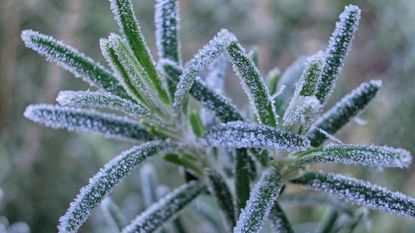

Winter Herbs That Can Tolerate Cold Weather
Growing winter herbs in your garden is a great way to enhance your cooking, but many popular garden herbs are native to the Mediterranean. This means that your cold-climate herb garden may take a serious hit from frost and snow.
Herbs are grown globally for their aromatic, culinary or medicinal properties. Some herbs, specifically annual herbs, are less hardy than perennial herbs. Tender annual herbs like basil and cilantro are not winter-hardy and have to either be grown inside or resown again in the spring. Here are some tips on caring for herbs in cool climates.
Cold-Hardy Herbs that Survive Winter
Herbs that can survive outdoor winter conditions vary from region to region. What survives in one person’s zone 8 garden may decline in another’s zone 4. Planting them in raised beds or beneath cloches, hoop tunnels or cold frames can protect herbs so they can be grown well into the winter months. Without protection from chilly conditions though, even the hardiest herbs will die back until spring when air and soil temperatures warm. Some cold hardy herbs grow as perennials, going dormant in the winter and coming back with new growth in the spring but some cannot survive a cold winter.
A few weeks before the first frost of autumn, prune your herb plants, removing any woody or dead stems and snipping off upper leaves. This will keep their spring growth in check, and what you trim can be dried or frozen for use in the winter.
You may want to dig your plants up and transfer them to containers that can be kept by a sunny window throughout the winter. This will protect your plants and give you fresh herbs for cooking all year long. Year-round container growing is recommended for less winter-hardy herbs.
Here’s a regional list to help you choose perennial herbs that survive a cold climate.
Perennial Herbs for Zone 4
Gardening tips, videos, info and more delivered right to your inbox!
Sign up for the Gardening Know How newsletter today and receive a free download of our most popular eBook "How to Grow Delicious Tomatoes."
Zone 4 is known for frigid winter temperatures so if you want to grow herbs that will make it through winter, choose cold-hardy chives, garlic chives, lovage, mint, oregano, sage, sorrel, Russian tarragon, thyme, or yarrow. Even these cold-hardy options may need extra protection such as those mentioned above.
Perennial Herbs for Zone 5
Herbs that are hardy or will self-sow in zone 5 include cilantro/coriander, chives, dill, lavender, mint, oregano, parsley, sage, and thyme. Again, although these herbs are hardy, without protection, they will die back during the wintertime only to return again in the successive spring.
Perennial Herbs for Zone 6
USDA zone 6 is warmer and therefore the herb list is getting a bit longer. All zone 5 herbs can be grown in this region, as can angelica, catnip, chamomile, comfrey, feverfew, lemon balm, rosemary, rue, St. John’s Wort, and valerian.
Perennial Herbs for Zone 7
Warmer still although some areas can be quite wet, perennial herbs that thrive in zone 7 include all of those for zone 6 as well as bay laurel, bee balm, echinacea, anise hyssop, and fennel which may also survive in zone 6 if protected and depending upon weather conditions.
Annual and Biennial Cold-Hardy Herbs
Herbs that reseed themselves or are biennials, although not considered winter hardy per se, will survive to thrive once again in the spring. Borage, calendula, chervil, cilantro/coriander, and dill often reseed themselves from year to year, sometimes overly generously.
Biennials are in the same category as self-sowers. While they may not be usable during the winter months, herbs like angelica, caraway, clary, parsley and watercress will also thrive when temps warm in the spring.
Tips for Overwintering Herbs
Caring for herbs in cool climates often means simply choosing the right plants. Some herbs fare much better in cold climates. Some survive winter more often than not, particularly if they overwinter with a good continuous snow cover:
Lavender is also quite cold hardy, but is often killed off in the winter by too much moisture. If you want to try overwintering it, plant it in extremely well-drained soil and mulch it heavily in the winter.
Raised beds are great for areas of heavy rain since many herbs prefer drier root systems. Again, cloches, cold frames, hoop tunnels, and greenhouses are excellent ways to protect herbs from freezing temperatures.
Mulch and Protect
If your herbs are staying in the garden for the winter, be sure to mulch them; pine needles or bark mulch are excellent options. Do not apply mulch until after the first freeze, and then remove it promptly when temperatures warm in the spring. Before mulching, give the herbs a trim. Don’t prune them back, just remove enough of the plant to tidy it up. Herbs that are more sensitive to cold may need a thicker layer of mulch and an extra covering of evergreen boughs to get them through the winter.
Some bushy herbs will benefit from protection from the wind. Herbs that tend to keep their leaves through the winter months, such as sage or winter savory, will benefit from a covering of tarp, burlap, cloth or even bubble wrap.
Depending on your USDA zone and temperatures, some herbs can survive under covered patios or overhangs provided they receive enough light.
Another option is to bring your herbs indoors. Pot up herbs you intend to use during the winter and bring them inside. Provide them with a sunny, south-facing window and many herbs will happily ride out the winter indoors. This works with many perennials but even tender annuals like basil can be overwintered indoors. Simply pot up your basil and place it in a window that gets at least 6 hours of sunlight per day.

Amy Grant has been gardening for 30 years and writing for 15. A professional chef and caterer, Amy's area of expertise is culinary gardening.
-
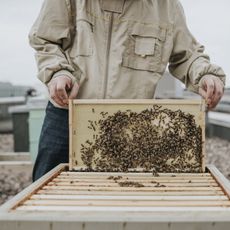 Urban Beekeeping Guide: Top Tips For Raising Bees In The City
Urban Beekeeping Guide: Top Tips For Raising Bees In The CityUrban beekeeping can be a rewarding and appreciated pastime, but first be sure it’s legal in your city and learn the ropes of beekeeping.
By Mary Ellen Ellis
-
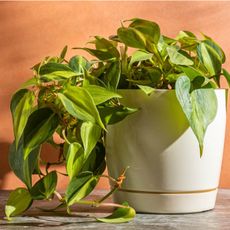 2024 Plant Of The Year: Why Experts Say Philodendron Is The “It” Plant Of The Year
2024 Plant Of The Year: Why Experts Say Philodendron Is The “It” Plant Of The YearWe aren’t surprised that philodendron was designated the plant of the year. Versatile, easy-care and lovely, it’s the houseplant of the year 2024!
By Bonnie L. Grant
-
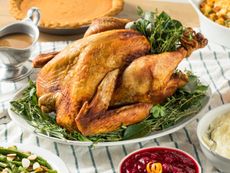 Grow Tasty Herbs For Roast Turkey In Your Garden
Grow Tasty Herbs For Roast Turkey In Your GardenCan you season your turkey with herbs you grow in your own garden? Yes! Click to learn more.
By Amy Grant
-
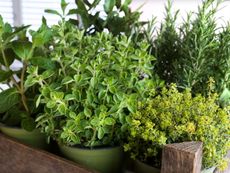 10 Easy Herbs For Beginners
10 Easy Herbs For BeginnersIf you’re new to herb growing, there are some perfect beginner herbs that are low maintenance and easy. Here are our top ten.
By Mary Ellen Ellis
-
 How To Make A Rain Gutter Herb Garden
How To Make A Rain Gutter Herb GardenOne really fun look outside the box is a hanging rain gutter herb garden. A gutter planter is a unique way to house and showcase plants.
By Bonnie L. Grant
-
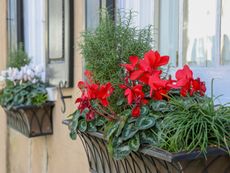 Grow A Beautiful, Edible Herb Window Box
Grow A Beautiful, Edible Herb Window BoxGrowing herbs in window boxes is a space-saving method for producing culinary ingredients for kitchen use. Click for more.
By Laura Miller
-
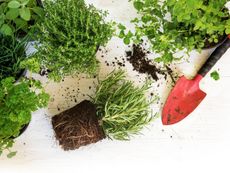 Best Herbs To Direct Sow Vs. Start Indoors
Best Herbs To Direct Sow Vs. Start IndoorsKnowing when to buy herb plants or start them from seeds or cuttings is essential to your success. Read on to learn more.
By Laura Miller
-
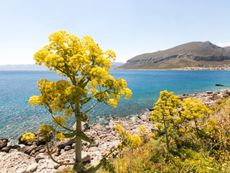 Learn About The Highly Prized Silphium Herb
Learn About The Highly Prized Silphium HerbWhat if there was a perfect plant? In ancient times such a treasure existed. It was the silphium plant.
By Laura Miller
-
 Grow Healing Herbs Indoors: Combat Winter Illness With A Medicinal Garden
Grow Healing Herbs Indoors: Combat Winter Illness With A Medicinal GardenIf you are growing medicinal plants at home, did you know you also can grow an indoor medicinal herb garden? Read on for more.
By Susan Albert
-
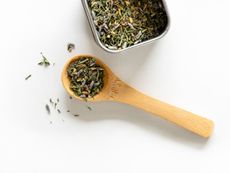 Grow Your Own Herbes De Provence - How To Grow, Dry, And Store Herbs
Grow Your Own Herbes De Provence - How To Grow, Dry, And Store HerbsHomemade gifts can add that special touch to any occasion, such as a jar of herbes de provence. Click here to learn how to grow and make your own for gifting.
By Laura Miller